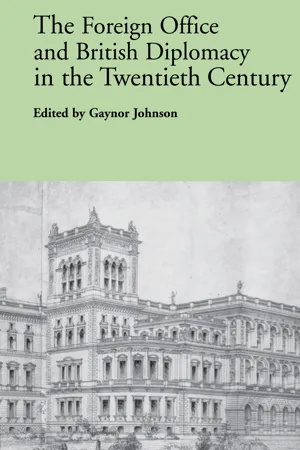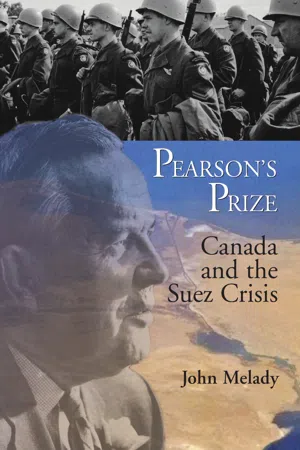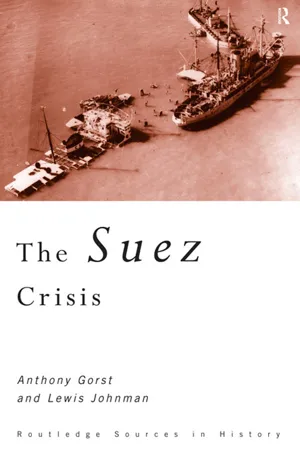Anthony Eden
Anthony Eden was a prominent British politician who served as Prime Minister from 1955 to 1957. He is best known for his handling of the Suez Crisis in 1956, during which he sought to regain control of the Suez Canal from Egyptian President Gamal Abdel Nasser. Eden's leadership during this crisis ultimately led to his resignation and tarnished his political legacy.
8 Key excerpts on "Anthony Eden"
- eBook - ePub
- Robert Pearce, Graham Goodlad(Authors)
- 2013(Publication Date)
- Routledge(Publisher)
...11 Anthony Eden (1897–1977) Prime Minister April 1955–January 1957 ‘I don’t believe Anthony can do it.’ Winston Churchill to his private secretary, the night before his retirement as Prime Minister, 4 April 1955 1 It is Anthony Eden’s misfortune to be remembered almost solely for his association with the Suez crisis, which occupied less than six months in a political career lasting more than three decades. In the autumn of 1956 Eden faced, and by common consent failed, the decisive test of his premiership with his clumsy use of force in reaction to the Egyptian President Nasser’s nationalization of the Suez Canal. Convinced that he had to face down a Middle Eastern version of the interwar Italian dictator, Benito Mussolini, Eden involved Britain in a military expedition in a bid to recover control of the waterway. The action aroused unprecedented international condemnation, led by Britain’s most important ally, the United States, who refused to support the pound when it came under pressure on the international money markets. The outcome was a humiliating suspension of the operation and the premature termination of Eden’s career as Prime Minister. Although ill health was the official reason for his resignation – and it undoubtedly played a part in the unfolding of the Suez drama – there was no doubt that his downfall was the result of a major failure of political judgement. The rise to the premiership It was ironic that Eden’s downfall was caused by his failure to handle an international crisis successfully, since the greater part of his ministerial experience lay in foreign affairs. Appointed Foreign Secretary by Stanley Baldwin at the age of 38, he was retained in the post by Neville Chamberlain on his succession to the premiership in May 1937. Nine months later a policy disagreement over relations with fascist Italy, which overlay a deeper personality clash with the Prime Minister, led to Eden’s resignation from the Cabinet...
- eBook - ePub
50 Speeches That Made the Modern World
Famous Speeches from Women's Rights to Human Rights
- (Author)
- 2016(Publication Date)
- Chambers(Publisher)
...18 Anthony Eden British statesman Robert Anthony Eden later 1st Earl of Avon (1897–1977) served as the Conservative MP for Warwick and Leamington from 1923 to 1957, holding various governmental positions including that of Foreign Secretary. He succeeded Churchill as prime minister in 1955 and in 1956 he ordered British and French forces to occupy the Suez Canal Zone ahead of the invading Israeli army. His action was condemned by the United Nations and caused a bitter and prolonged controversy in Britain which did not subside when he ordered a withdrawal. In failing health, he abruptly resigned the premiership in 1957. Regarded as one of the Western world’s most experienced statesmen, he aimed principally for world peace based on respect for law. ‘This is a time for action’ 2 November 1956, television and radio broadcast from London, England This address to the British public was an attempt by Eden – by now prime minister – to justify military intervention in Egypt during the Suez Crisis. What makes the speech remarkable, however, is what he chose not to say. The crisis began when the Egyptian president, Gamal Abdel Nasser, nationalized the Suez Canal, previously controlled by British and French companies. Britain and France, fearful that Nasser might prevent oil shipments reaching Europe, made a secret agreement with Israel. Four days before Eden’s address, Israeli troops invaded Egypt and took control of the Canal Zone. Claiming no prior knowledge of the invasion, Eden announces plans to send British forces to police a ceasefire between the Israeli and Egyptian sides. In the process, of course, Britain would retake the Suez Canal. In conciliatory tones – designed to appease a country divided over the affair – he argues that intervention was necessary to prevent a ‘forest fire’ in the Middle East from spreading...
- Keith Layborn(Author)
- 2002(Publication Date)
- Routledge(Publisher)
...Sir (Robert) Anthony Eden (First Earl of Avon) 1897–1977 Anthony Eden is invariably remembered for his involvement with the Suez Canal Crisis in 1956 when Britain and France, with the aid of Israel, invaded Egypt in response to the decision of Colonel Nasser to nationalize the Suez Canal Company. The ignominious withdrawal of British and French forces, in the face of American pressure, led to Eden’s resignation on grounds of ill health. Yet the Suez Crisis was an unfortunate end for a politician who emerged as diplomat of some distinction during the inter-war years. Eden was born on 12 June 1897 at Windlestone Hall near Durham, the third son of Sir William Eden and Sybil Gray, although there is some suggestion that his real father might have been the politician George Wyndham. He had an unhappy childhood and did not enjoy his time at Eton. Nevertheless, he distinguished himself in the First World War, winning the Military Cross and becoming the youngest brigade major in the British army. After the war he went to Christ Church, Oxford where he obtained a first-class honours degree in Oriental Languages. In 1923 he married Beatrice Beckett. Eden’s political career began in 1923 when he became Conservative MP for Warwick and Leamington, a seat he held until his retirement from the House of Commons in 1957. He performed a number of junior roles in Stanley Baldwin’s Conservative government of 1924 to 1929. He was Parliamentary Private Secretary to the Parliamentary Under-Secretary at the Home Office between 1924 and 1926, and fulfilled the same role at the Foreign Office in 1926 before rising to become Parliamentary Private Secretary to the Foreign Secretary (Sir Austen Chamberlain) between 1926 and 1929. He rose further in the National Government of the 1930s, becoming Parliamentary Under secretary at the Foreign Office between 1931 and 1933, Lord Privy Seal between 1933 and 1935 and Minister without Portfolio for League of Nation Affairs in 1935...
- eBook - ePub
- Kevin Jefferys(Author)
- 2015(Publication Date)
- Atlantic Books(Publisher)
...The conventional wisdom was that Eden had everything going for him: film-star good looks and an impeccable record as Foreign Secretary since 1951 made him ideally suited to lead a confident party anticipating electoral victory. ‘It is fortunate for Britain that there exists to succeed Sir Winston a leader who is a world statesman in his own right,’ wrote the Yorkshire Post. (National newspapers were on strike at the time of the announcement of Churchill’s retirement.) Eden, the Yorkshire Post confidently predicted, would be a success as Prime Minister because he was able to ‘command respect in the Cabinet room, in the House and in the country’. 2 But it all went terribly wrong. Within two years his premiership was sunk in the murky waters of the Suez Canal, in a crisis that was to have major repercussions for Britain’s international status as well as for Eden’s leadership. He resigned in January 1957, the failure of his aborted military operation in the Middle East leaving a stain on his reputation more indelible even than Chamberlain’s association with appeasement. In a 1990s’ poll of politicians, journalists and academics on the success of twentieth-century Prime Ministers, Anthony Eden found himself firmly anchored at the bottom of the list, just below Neville Chamberlain. 3 This inability to live up to expectations has rightly been attributed in numerous accounts of the Suez crisis to Eden’s personal failings, such as his lack of experience in domestic politics and his volatile temperament. Yet if he proved unexpectedly ill-suited to the demands of the premiership, it was also the case, as sympathetic biographers have pointed out, that Eden’s prospects were less rosy in the spring of 1955 than many thought. 4 Aside from his fragile health – always precarious after he underwent major surgery on a bile duct in 1953 – he came to power when Britain’s underlying economic weaknesses were becoming impossible to conceal...
- Gaynor Johnson, Gaynor Johnson(Authors)
- 2013(Publication Date)
- Routledge(Publisher)
...Moreover, Eden's experience of trying to work with the Americans in the 1952–55 period was hardly a positive one. ‘They like to give orders, and if they are not at once obeyed they become huffy’, he complained in 1954. That was ‘their conception of an alliance — of Dulles' anyway’. 40 It was Eden's sense that the disadvantages of alliance with the United States in both the Middle East and Southeast Asia had become as great as the advantages that allowed him to accept with some equanimity the failure to construct formal and fully-functioning defence organisations in both parts of the world. Finally, Eden's diplomatic annus mirabilis clearly caused him to question the necessity of power-by-proxy. In 1954, Britain — and Eden — appeared to be wielding power without the need for artificial props. The word ‘appeared’ requires emphasis because there is much to recommend the argument that Eden's apparent ‘mastery of the international scene distorted his view of Britain's, and his own, ability to direct events’ and led him to ‘indulge in self-deception about the country's inherent strength and its capacity to pursue a course independent of the United States’. 41 Two years on, Suez would add some perspective. In retrospect, Eden might have done better to remain loyal to power-by-proxy, even to the extent of occasionally following the US lead in the greater interest of harmonious Anglo-American relations. But that was not his style. Whether power-by-proxy was the right strategy for Britain in the early and mid-1950s can be debated, but what seems unmistakably clear is that Eden, with his jaundiced view of American foreign policy and his tendency to strike out in an independent direction given half a chance, was the wrong man to front the strategy. In January 1957, Eden resigned as Prime Minister, brought down by the Suez crisis and ill health. The details of the crisis are sufficiently well known as to require no recapitulation at this point...
- eBook - ePub
- Mark Dunton(Author)
- 2021(Publication Date)
- Pen & Sword History(Publisher)
...Anthony Eden Born: 12 June 1897 Died: 14 January 1977 Dates in Office: 6 April 1955 – 9 January 1957 Party: Conservative Anthony Eden. INF 3/75 Pt 3 In late August 1956, pressures were mounting during the Suez Crisis. In July, Egyptian leader Colonel Nasser had nationalised the Suez Canal. The bulk of Western Europe’s oil was transported through the canal, as well as a good deal of trade for Commonwealth countries; Eden was determined to reverse Nasser’s action and establish control of this crucial route. Eden became obsessed with the notion that Nasser was another Mussolini, who should definitely not be appeased, but faced down most strongly (and if possible, overthrown). The consensus among historians is that he misapplied the lessons of history. Eden’s draft reply to Sandys circa 22 August 1956. PREM 11/1152 Diplomatic negotiations were underway but Eden secretly colluded with France (and, later, Israel) to launch an attack on Egypt. The Cabinet considered the use of force as a hypothetical question, as a last resort if all else failed, but no details had been discussed around the Cabinet table. On 23 August, Cabinet Minister Duncan Sandys wrote to Eden expressing the hope that the Cabinet as a whole would ‘be consulted as soon as possible about the broad lines of the military plan which is being prepared’. He was clearly concerned that Eden might suddenly move ahead without full consultation. Cabinet Secretary Norman Brook drafted this note for the Prime Minister, as a reply to Sandys. The two crucial sentences are: ‘knowledge of these details must, for obvious reasons of security, be confined within the narrowest possible circle. [I could not widen that circle, even if I wished to, without breach of the security plan which we have agreed with the French Government]’. This second sentence (shown above in square brackets) was omitted from the final version sent to Sandys...
- eBook - ePub
- John Melady(Author)
- 2006(Publication Date)
- Dundurn Press(Publisher)
...Even before he left for his rest in the tropics, there had been an element of discontent among his colleagues about his inadequacies in governance. Now that he was out of the country, the proponents of change became bolder and more outspoken, and the move to dump Eden increased. The press picked up on this and speculated on it. In a Reuters dispatch from London, two weeks after Eden left, his fall was predicted: “Prime Minister Eden’s absence during Suez crisis developments brought speculation . . . about a change in leadership. As the crisis moves from one vital phase to another, some Conservatives [Eden’s party] openly predict a change of leadership soon.” 279 The crisis in Britain’s economy, which had been largely brought about by the adventure in Egypt, was also hurting Eden’s cause. In mid-December, Pearson flew to London for talks with senior officials in the British government. On his return to Ottawa, he sent a memorandum to St. Laurent that detailed some of the impressions he got from the time overseas. “There is no doubt in my mind now that the whole ill-conceived and ill-judged enterprise, at least on the British side, was Eden’s,” wrote Pearson. “Eden was the active, determined and confident leader of the enterprise, showing qualities of vigour and resolution worthy of a better cause.” 280 Pearson added that after his discussions with Selwyn Lloyd, Rab Butler, and Harold Macmillan, he felt that Eden’s days as prime minister were numbered. And he was right. Eden returned from Jamaica and was back in Parliament on December 17. The welcome for him was rather subdued. The Opposition members were largely silent, while his own supporters were respectful but not particularly effusive in their reaction to his presence...
- eBook - ePub
- Anthony Gorst, Lewis Johnman(Authors)
- 2013(Publication Date)
- Routledge(Publisher)
...With the possibility of Israeli co-operation against Egypt in mind, Eden was concerned to minimise the likelihood of a confrontation with Israel over Jordan. Eden, without consulting the Cabinet, had taken the significant step of encouraging the Israelis by waiving Britain's obligations under the Tripartite Declaration. While Eden's handling of these complex manoeuvres was technically deft, questions have been raised as to the wisdom of the action. However, Lloyd indicates in his memoirs that after some discussion ‘eventually it was accepted by Butler and the rest of the Cabinet that we and France should intervene to protect the Canal, if Israel moved against Egypt': this account is further substantiated by Kyle (Lloyd, 1978, p. 177; Kyle, 1991, pp. 307–308) Moreover, encouraging answers had been sent to the French for transmission to the Israelis even before the full Cabinet met. Collusion was thus both gathering momentum and becoming increasingly enshrouded in secrecy: this is the first of a number of discrepancies that are only explicable by a tampering with the historical record. News that the Israeli Prime Minister, David Ben-Gurion, had arrived in Paris with a delegation, including Moshe Dayan, for consultations with the French, at which they wished a British representative to be present, led Eden to convene a meeting on 21 October 1956 at which it was decided that Lloyd should travel to the next day Paris for further consultations...







